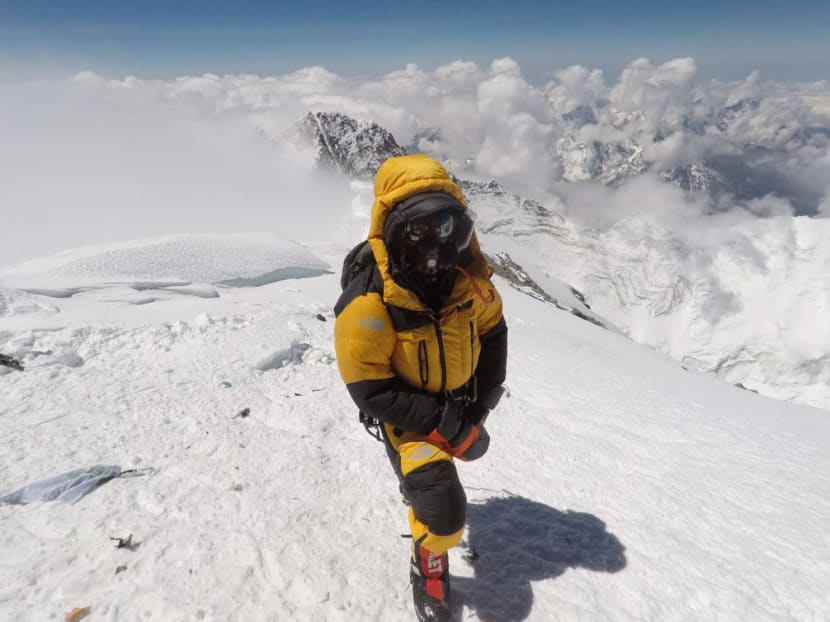Near-death experience made her Mt Everest climb ‘more memorable’
SINGAPORE — Barely 15 minutes after she reached the peak of the world’s highest mountain, trainee teacher Nur Yusrina Ya’akob nearly plunged to her death when a climber attached to a shared climbing rope from the rear slipped and fell, pulling her along.


SINGAPORE — Barely 15 minutes after she reached the peak of the world’s highest mountain, trainee teacher Nur Yusrina Ya’akob nearly plunged to her death when a climber attached to a shared climbing rope from the rear slipped and fell, pulling her along.
The near-death experience, however, made her conquest of Mount Everest last month more memorable given that she succeeded only on her second try. Her maiden attempt, as part of the celebrations to mark Singapore’s Golden Jubilee in 2015, was aborted due to the massive earthquake that devastated Nepal.
Her three-man multiracial team, formed under the “Unity in diversity” tagline, came together last July after her team-mates reached out to her with a common interest in scaling Mount Everest. Their expedition was supported by Nanyang Technological University (NTU) and the National Institute of Education (NIE).
Ms Yusrina was the only person to successfully reach the 8,848m peak on May 22, making her the first Singaporean to do so since the last successful expedition in 2009 by the Singapore Women’s Everest Team.
“I knew that coming down would be difficult, but I didn’t know that I would face such an experience,” the 30-year-old said, recalling her ordeal which took place at the Hillary Step, a near-vertical rock face about 8,800m above sea level.
She fell five to six metres, spinning laterally along the way before being jerked to a halt by her safety rope, which allowed her to land safely “on two feet” on a rock.
“When I realised that I was going away from the mountain and my whole body was airborne, I thought, ‘that’s it’,” she said. “But in that same split-second, I was pulled back by the rope. When I was on the rock, I ... just cried (because) I realised how close I was to falling off the mountain.”
Her interest in mountaineering started in 2006, when she joined the National Mountaineering Club as an undergraduate. She was hooked after she got her first taste of high-altitude mountaineering.
But the thought of scaling the world’s highest peak did not come to her until she saw it for the first time in 2008. Standing atop the 6,476m Mera Peak in Nepal, a popular trekking mountain, she told herself: “One day, I want to climb Mount Everest.”
But her first attempt two years ago was scuppered by an avalanche caused by the Nepal earthquake. The co-leader of the Aluminaid Team Singapura Everest 2015 squad said they had to turn back after passing the 5,500m mark.
She had dreams about her first expedition in the days leading up to her second trip, which made her anxious about her impending climb. But her team-mates helped to reassure her and once she got to the mountain, her nerves disappeared.
Despite having fulfilled her long-time dream — a journey she describes as “humbling” — Ms Yusrina does not intend to stop. She is certain that she will be climbing more mountains in time to come.
Her team-mates, Mr Jeremy Tong, 26, a recent graduate from NTU’s Sports Science and Management programme, and Dr Arjunan Saravana Pillai, 47, a teaching fellow at NIE, failed to reach the summit because of hypothermia.
Mr Tong, who was a mere 200m or so from the peak, had to make the difficult decision to turn back because of literal cold feet. Had the condition been ignored, it might have resulted in the loss of his toes. The 26-year-old experienced mountaineer, who has scaled over 30 peaks in South-east Asia, Latin America and Africa, aims to give it a second shot next year.
Dr Saravana, on the other hand, suffered such a bad case of frostbite that two of his fingers remain visibly darkened to this day, a month after the team returned to Singapore.
On the disappointment of staying behind at base camp, he said: “It was emotional ... having come that far.” But upon hearing about how some people had lost all 10 digits in their attempt to reach the peak, he made the “difficult” decision to abandon his climb.
“Trials and tribulations are part and parcel of life,” he said, adding that he hopes their experience would inspire young people to take an interest in the outdoors, where “very real, very volatile, and evolving” conditions will require “adaptability, tenacity, (and) resolve”.
“All of such ingredients will add flavour to an individual’s character,” he said. “The mountain will always be there; I can always try again.”






